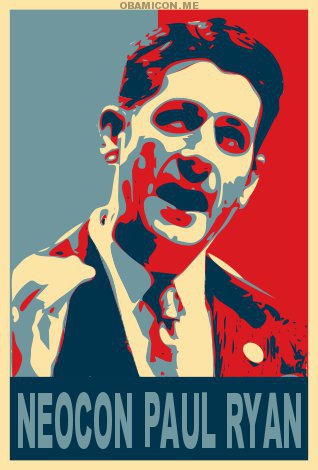
Or, A Tale of Two Pauls
Periodically the federal government must pass budgets for the their own operations. These budgets must pass both the House and the Senate and be signed by the president. If a budget is not passed by a certain deadline, then the federal government must “shut down.” Now, this shutdown is only partial; only those things deemed non-essential are affected by the shutdown. The federal government, of course, erroneously views the bulk of what it does as “essential,” and so a government “shutdown” really isn’t nearly as major as it sounds. The list of non-essentials includes national parks, veterans affairs, the IRS, and the EPA (you can find a full list of affected and unaffected agencies/services here). And this situation is what the federal government will face if the Republicans and Democrats cannot reach a budget agreement by the midnight deadline tonight (less than twelve hours from now). With the lack of progress of the past several weeks towards an agreement, and with Mr. Obama threatening to veto a Republican proposed one-week stopgap bill, this outcome seems extremely likely.1 While the prospect of the shutdown of the IRS makes any true conservative jump for joy, the focus of this article is on the proposed budgets rather the results of a shutdown.
The average American voter holds to the view that the Republican Party is the party of small government and fiscal conservativism, while the Democratic Party is the party of big government and socialism. The new Republican poster boy, Wisconsin Representative Paul Ryan, would certainly have you believe so. Last week he revealed a budget that the Republicans have rallied around as the great conservative answer to Mr. Obama’s bloated monstrosity of a budget. The reality, of course, is that both parties are committed to the fundamentals of the big government socialist welfare/warfare god-state. Republican politicians and their apologists will object to this and protest that if only we voted them into power, things would change; we would finally have a government committed to the Constitution, small government, spending cuts, and fiscal conservativism. Very well: let us examine what happens when Republicans have control of the U.S. government. From 2002 to 2006, the Republican Party had majorities in the U.S. House and U.S. Senate, occupied the White House, and had a super-majority of Republican appointed Justices on the U.S. Supreme Court; in other words, the U.S. had a completely Republican-controlled government.2 Did this Republican government usher in a new era of fiscal conservativism? Of course not. Like a fat kid in a candy store, the Republicans couldn’t find anything in the budget they didn’t like. Total federal spending increased at a rate never before seen to levels never before seen:
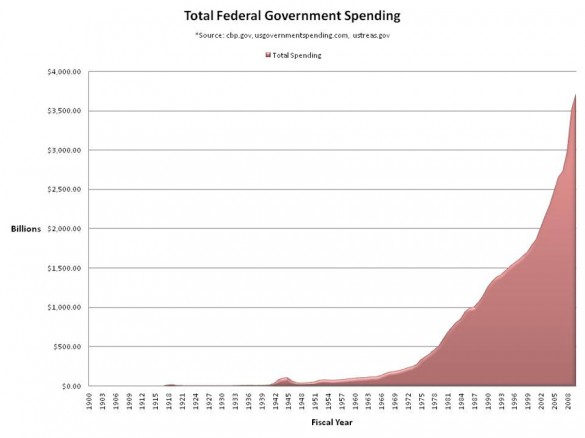
When the Republican Party came into power in 2002, the national debt stood at $6 billion. When they lost control of the U.S. Senate in 2006, the national debt stood at over $8 billion – both the largest total increase and the fastest rate of increase compared to any previous four-year period in U.S. history.
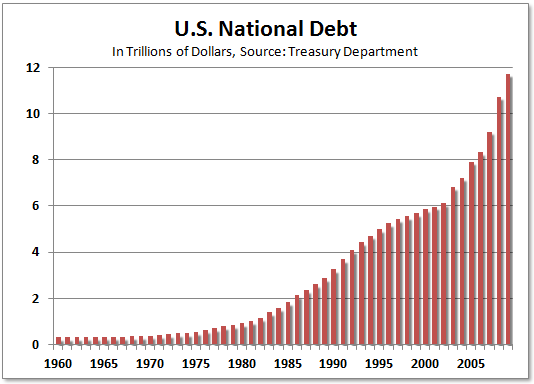
Some will try to make the argument that spending and debt went up simply because we were (and are) at war, which necessitates more spending. But putting aside the fact that those wars are unconstitutional and illegal, in which case any money spent on them is likewise illegal, we still can note that, at best, less than half of the spending increases were in the defense category, and the wars only make up a small part of what the defense category covers. As a side note, don’t try to blame all of that huge uptick in 2009-2010 non-defense spending on Mr. Obama, as half of that was President Bush’s bank/corporate bailout:
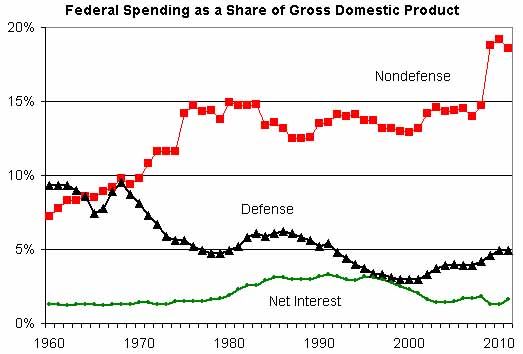
Taking this a step further, we clearly see that discretionary spending increased by 25% from 2002 to 2006. Though this category excludes mandatory spending (like Social Security and Medicare) and is thus much easier to cut, the Republicans failed to do so:
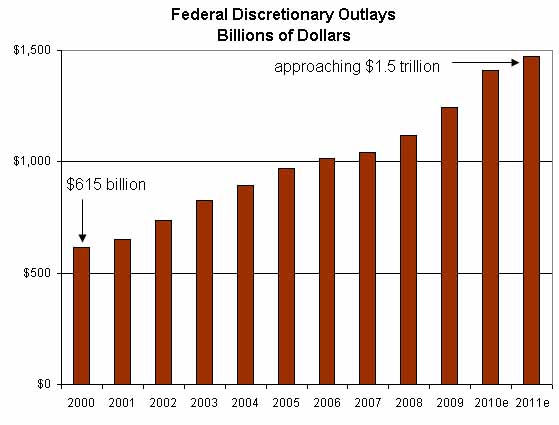
But didn’t some Republicans oppose all this? Yes, during this entire period, Rep. Ron Paul was consistently voting against spending increases. And what was the Republican poster boy Rep. Paul Ryan doing? He was voting in favor of every spending increase the Republican leadership and President Bush could put forward. Rep. Paul Ryan voted in favor of No Child Left Behind, the huge 2003 Medicare expansion, the TARP bailouts, the funding of expensive foreign wars, and numerous other unconstitutional spending increases.3 You see, the Republican Party loves big government; Rep. Paul Ryan loves big government. It’s just that they want the big government to be controlled by Republicans and funding their own little pet projects. To put forward Rep. Paul Ryan as a great “fiscal conservative” and to have him promote the Republican budget is, at best, highly suspect from the start.
Things only get worse as we examine what Ryan’s budget actually entails. The Libertarian Party chairman Mark Hinkle summarized Ryan’s budget like this:
Republicans [with Ryan’s budget] want to spend $40 trillion over ten years. That averages a staggering $4 trillion per year. As recently as 2000, federal spending was only about $1.8 trillion.
They also want to increase the federal debt from $15.0 trillion to $23.1 trillion. I hope our children and grandchildren enjoy paying interest on that extra $8.1 trillion. . . .
In 2021, Paul Ryan still wants the feds to be spending 19.9% of GDP. That’s a higher percentage than during Democrat Bill Clinton’s second term. In 1997, federal spending was 19.5% of GDP, and it dropped to 18.2% by 2000. Paul Ryan is worse than Bill Clinton.[4. http://www.lp.org/news/press-releases/libertarians-say-paul-ryan-is-worse-than-bill-clinton]
Indeed, the same conservatives and party who were howling about President Clinton’s big government spending are now lauding Rep. Paul Ryan’s budget, with its higher spending levels, as a great conquest for fiscal conservatism. It should come as no surprise that a neocon like Rep. Paul Ryan doesn’t even attempt to cut the ballooning defense spending.4 Ryan’s budget wouldn’t even balance the federal budget until 2063.5 Read that again: 2063! – 52 years from now; that’s a generation and a half. In U.S. politics, where plans and budgets often do not last longer than a two-year congressional term and rarely last longer than a U.S. Presidential term, a 52-year plan is basically conceding that the budget will never be balanced.
Is Ryan’s budget better than Mr. Obama’s? Certainly, but that’s like saying that rotten eggs are more edible than rat poison. To use another analogy, we are all driving in a car towards the edge of a cliff, and while the Democrats want to drive over the cliff going 60 mph, Rep. Paul Ryan objects that that is crazy – it would would be so much better to plummet to our deaths at 45 mph.
In stark contrast to Rep. Paul Ryan’s budget, last month, newly-elected Kentucky Senator Rand Paul, son of Rep. Ron Paul, put forward his own proposed budget. Unlike Rep. Ryan’s budget, which just nibbles at the edges of spending while leaving the foundations of the warfare/welfare god-state intact, Senator Paul’s budget attacks the foundation of the unconstitutional edifice by eliminating all foreign aid and whole agencies and departments. This includes the Department of Commerce (some agencies will be maintained and transferred to other departments), the Department of Education, the Department of Energy (some agencies maintained and transferred), the Department of Housing and Urban Development, and the Bureau of Indian Affairs. The end result of all this is that the federal budget would be balanced by 2013. That’s right, 2013 – a full 50 years sooner than Rep. Ryan’s budget. Even further, Senator Paul’s budget in 2016 would offer over 1.2 trillion more dollars in tax relief to Americans than Mr. Obama’s proposed budget. You can read a summary of Senator Rand Paul’s proposed budget here, it’s relatively short and well worth it.
Is Senator Rand Paul’s budget perfect? No, it leaves a good number of unconstitutional areas of spending in place. However, one has to remember that it’s taken the Marxists over 80 years to get us to where we are today, which cannot be undone overnight. Senator Rand Paul’s budget is a step in the right direction, and a step in the right direction is a world of difference from just going in the wrong direction more slowly.
Now, I personally believe that we have already passed the point of no return and that there is no way to stop the federal government from financially collapsing. To return to the car analogy, we are simply too close to the edge of the cliff and are going far too fast. However, if we were to be able to slam on the brakes and miraculously avoid going over the edge, it will be with Senator Rand Paul’s budget, not Rep. Paul Ryan’s.
Footnotes
- http://www.foxnews.com/politics/2011/04/07/boehner-defends-tea-party-budget-demands/ ↩
- http://en.wikipedia.org/wiki/United_States_presidents_and_control_of_congress ↩
- http://www.lp.org/news/press-releases/libertarians-say-paul-ryan-is-worse-than-bill-clinton ↩
- http://nationalinterest.org/blog/the-skeptics/rep-ryan%E2%80%99s-budget-does-not-touch-military-spending-5124 ↩
- http://reason.com/archives/2011/04/06/paul-ryans-republican-budget-t/singlepage ↩
| Tweet |
|
|
|




